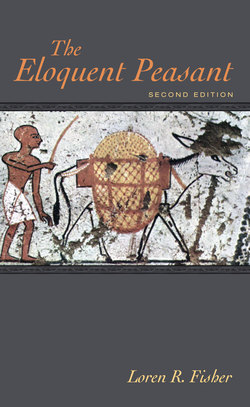Читать книгу The Eloquent Peasant, 2nd edition - Loren R. Fisher - Страница 6
Preface
ОглавлениеThe ancient Mediterranean world has given us many rich and colorful stories, and The Eloquent Peasant is by far one of my favorites. It is difficult for most of us to imagine a four-thousand-year-old story that considers the issues of social equality and the importance of perfect speech, but these issues are emphasized in this story. When the peasant went before the Chief Steward, his first speech amazed his audience. When this was reported to the Pharaoh, “His Majesty said, ‘Since surely, you desire to see me, and that I am well (B1 110), you should cause him to delay here, without answering anything he says. In order to keep him speaking, be silent. Then it will be brought to us in writing that we may hear it.’” Egyptians were interested in rhetoric and the gift of writing.
The Gift of Writing
Who was Dhwty? The Greeks called him Thoth.
Egyptians said that he gave them writing.
He invented it and some other things.
In Plato’s Phaedrus, Thoth says as follows:
“Writing improves memory and wisdom.”
But the King of Thebes said, “No” to all this.
“Rather, writing will destroy memory.”
Is Plato jealous and thus critical?
The context in Plato is rhetoric.
Interesting. Egyptians loved great speech.
The Eloquent Peasant gave nine speeches.
Now, the King of Egypt said to Rensi,
“In order to keep him speaking, be silent.
Then it will be brought to us in writing
That we may hear it.” And Rensi obeyed.
They were grateful for the gift of writing.
The Egyptians thought writing was helpful.
It was an aid to memory, praise Thoth.
It was a means of sharing and teaching.
It also provided entertainment.
When scribes took stories from oral telling,
The story was frozen, but it lived on.
The storyteller could compress or add to.
The written form does not rule; but it helps.
The structure of this story, right from the beginning, is built upon a series of speeches. This structure is well known in Hebrew literature. The book of Exodus is a prime example. See Exodus 4–14 and note the following: 4:1 “Moses answered; he said, . . . ”; 4:6 “Yahweh said, . . . ”; 4:10 “Moses said to Yahweh, . . . ”; this goes on and on. The Egyptians taught most of the east Mediterranean world how to write, and it had to do with more than just structure. You will be able to see such things as commandments in The Eloquent Peasant, for example, “Do not steal” and “Do not covet.”
Loren R. Fisher
10 May 2012
Medford, Oregon
